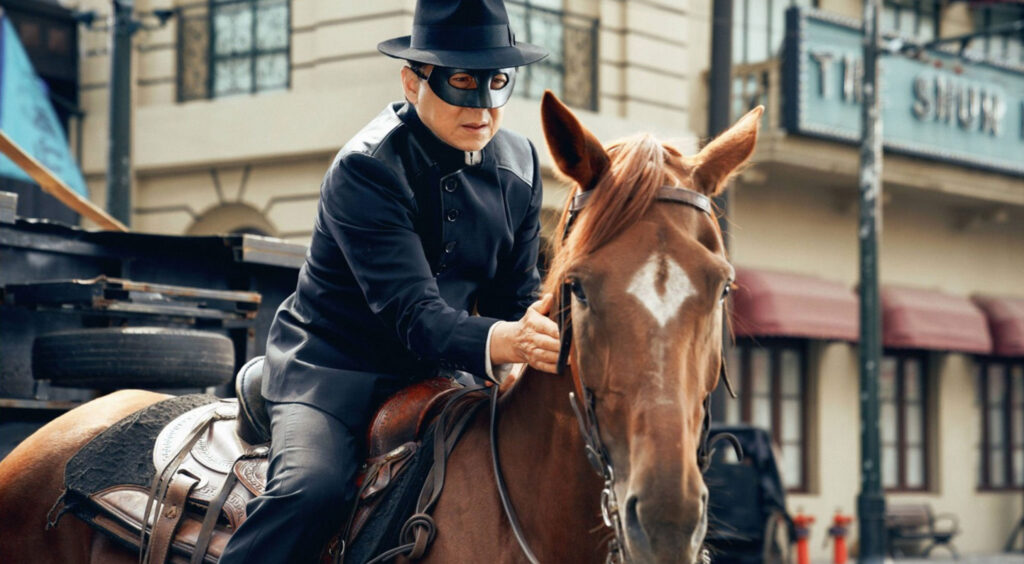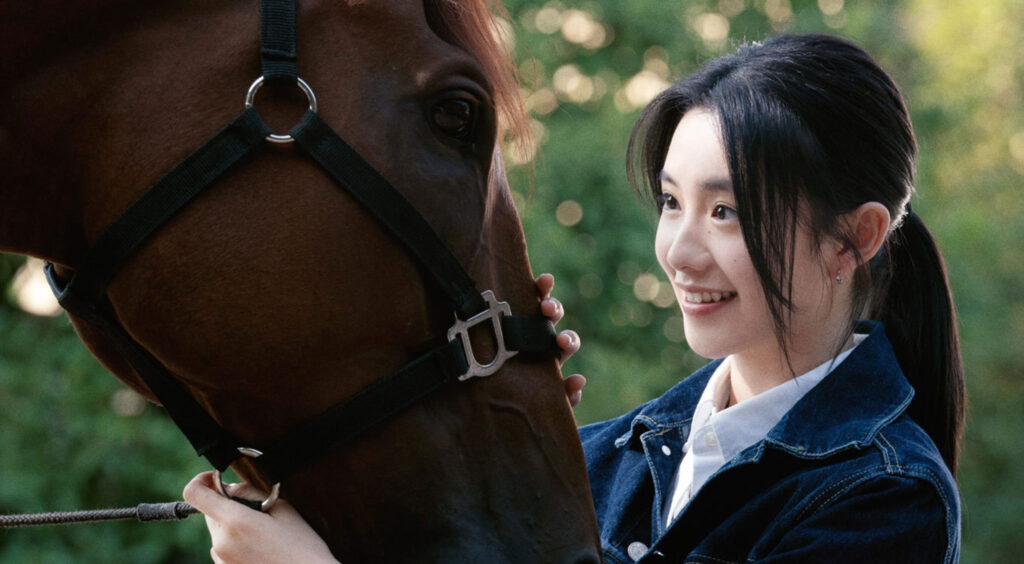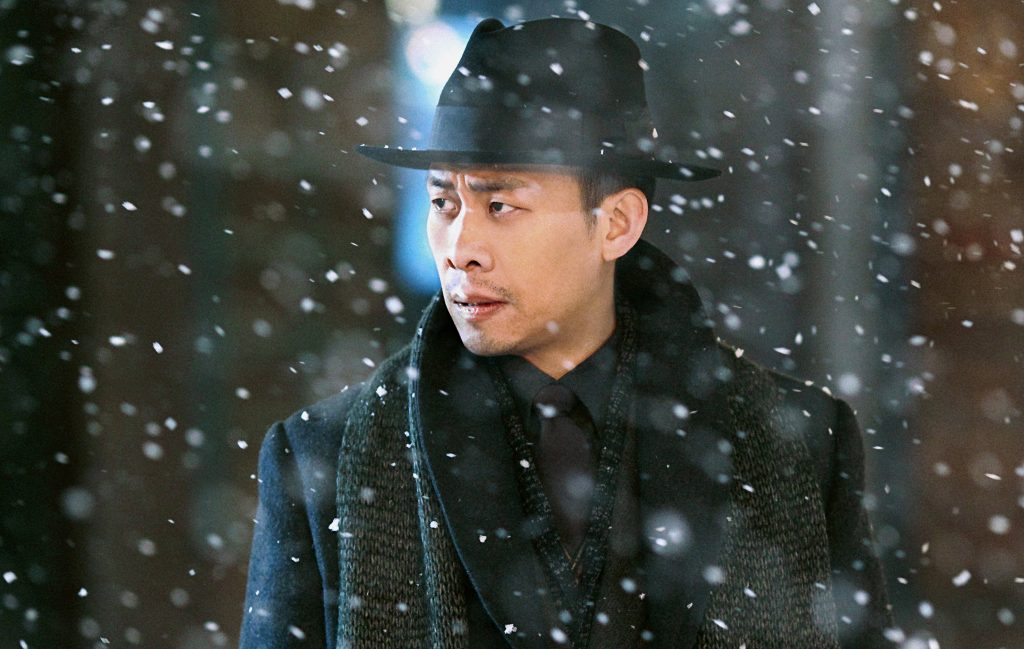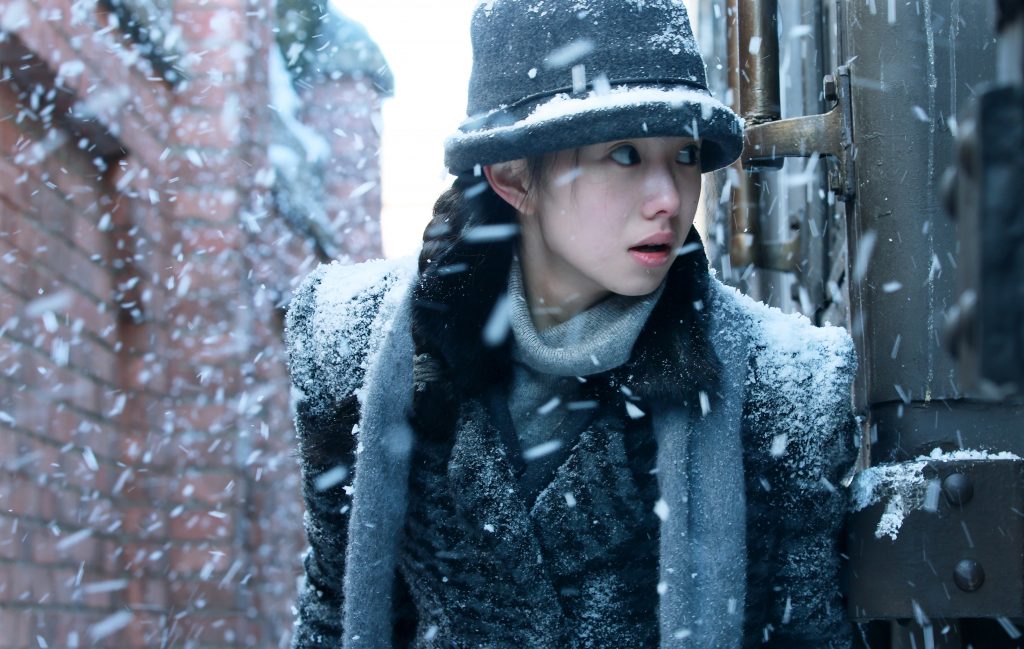April 15, 2023
by Carla Hay

Directed by Larry Yang
Mandarin with subtitles
Culture Representation: Taking place in various cities in China, the comedy/drama film “Devil’s Peak” features an all-Asian cast of characters representing the working-class, middle-class and wealthy.
Culture Clash: A has-been stunt man gets his beloved stunt horse taken away from him as part of a debt collection, and he fights to get the horse back with the help of his formerly estranged daughter and her attorney boyfriend.
Culture Audience: “Ride On” will appeal primarily to people who are fans of star Jackie Chan and movies about close relationships between intelligent pet horses and their devoted owners.

“Ride On” is unapologetically sentimental, but it’s mushy in all the right places. This comedy/drama could have used better film editing, but people who like movies about lovable horses should find something to like about “Ride On.” Yes, it’s one of those movies where visual effects, animal tricks and strategic film editing make the horse act more “human” than a horse would in real life, but the horse in the movie is so charming, it’s easy to go along with this fairy-tale-like story.
Written and directed by Larry Yang, “Ride On” begins by showing that divorced, middle-aged Lao Luo Zilong (played by Jackie Chan), also known as Luo, is a longtime stunt performer who has recently fallen on hard times. Luo and his longtime stunt horse Red Hare aren’t working as much as they used to because many filmmakers are using digital visual effects, instead of practical effects, for their movie stunts. Luo has an “old school” mentality and stubbornly refuses to accept these changes in moviemaking. To make money, he tres to get tourists to pose for photos with him an Red Hare at the movie studio where he and he horse did a lot of stunt work.
Luo is heavily in debt for a few reasons other than not working as much as he used to work. Those other reasons are explained later in the movie. As a result of his debt, Luo has been living in a ramshackle barn with Red Hare. Luo has been in a dispute with a corporation called DY Capital that has won a lawsuit to seize Luo’s assets. One day, debt collectors arrive and take away Red Hare, despite Luo’s vigorous attempts to prevent them from removing his beloved horse.
Luo’s estranged daughter Xiao Bao (played by Liu Haocun), who is a law student her 20s, happens to see Luo on day in a pathetic situation where he is practically begging people to pose for photos with him and Red Hare. Bao has a lot of bitterness toward her father, who has been mostly out of her life since Bao’s parents split up when she was a child. Bao’s deceased mother passed away from an unnamed terminal illness. Flashbacks show that Luo was mostly an absentee dad because of his busy work schedule and because he was unreliable when it came to spending quality time with his mother.
Bao and her mother eventually didn’t really want him around because of Luo’s pattern of not keeping his promises. Luo’s visitations with Luo became filled with more tension and became less frequent as their estrangement grew. Luo has been so out of touch with what’s going on in Bao’s recent life, he’s surprised when she tells him that she’s has a boyfriend.
Bao’s boyfriend, who’s about the same age as he is, happens to be a fairly new attorney. His name is Lu Naihua, also known as Mickey (played by Guo Qilin), who is sweet and very nerdy. As a stunt man, Luo is athletic and not afraid of taking physical risks. Mickey is almost the opposite, so there are a few comical scenes of Luo teaching a fumbling Mickey how to do things such as martial arts and horse riding.
When Luo confides in Bao about his financial problems and how he wants to get Red Hare back, at first Bao wants nothing do with helping Luo. But then, she changes her mind and says that she and Mickey will help Lao. A video of Luo and Red Hare resisting the debt collectors goes viral on the Internet, and most of the public sides with Luo. DY Capital still fights to keep Red Hare, so the dispute ends up in court. All of this information is already revealed in the trailer for “Ride On.”
Even though Luo is broke, he has two loyal apprentices who become part of the shenanigans that ensue: goofy Yuanjie (played by Wu Jing) and his no-nonsense wife Yingzi (played by Joey Yung). The two spouses helped take care of Red Hare, so they care very attached to the horse too. The movie’s “villain” is He Xin (played by Yu Rongguang), the wealthy CEO of DY Capital.
“Ride On” could have taken any number of different narratives to get to the inevitable ending. The movie doesn’t show a lot of preparation for the courtroom battle over Red Hare. Instead, “Ride On” shows a lot of flashbacks of how the relationship developed over the years between Luo and Red Hare at almost the same time that Luo’s relationship with Bao was falling apart.
There’s a very poignant scene where Luo first saw Red Hare, who was born with a lung problems and a leg deformity and was expected to undergo euthanasia until Luo intervened. The bond between Luo and Red Hare was immediate. Luo personally helped Red Hare get physically rehabilitated and then trained as a stunt performer.
The movie has more impactful scenes of a younger Bao experiencing heartache over her strained relationship with her father, while Luo feels guilt and shame for not being able to be the father that he knows he should be. Bao and Luo’s relationship continues to go through ups and downs during the course of the movie, since they have a lot of issues that don’t go away after they’ve reconciled.
As adorable as many of the horse scenes are, “Ride On” stumbles when it comes to the flashback stunt scenes, which look very fake. (A lot of obvious visual effects were used for gravity-defying stunts.) The movie should have stuck more to realism in these stunt scenes, instead of making Red Hare look like some kind of superhero horse. It’s ironic that Ride On” relies so much on these stunt visual effects, which is the same kind of filmmaking that has put stunt performers such as Luo and Red Hare out of work. Shi Yanneng has a supporting role in “Ride On” as Dawei, a former protégé of Luo’s who tries to help Luo find stunt work in a new movie.
Because of the sometimes choppy film editing, the flashbacks don’t flow as smoothly as it could for the movie’s overall narrative. At a certain point, “Ride On” becomes too caught up in the flashbacks, and viewers will be wondering when the movie is going to get to the dispute between Luo and DY Capital over who will get to keep Red Hare. Some of Luo’s flashbacks are actually clips from Chan’s real-life past movies, which can be unnecessary distractions that take viewers out of this fictional story.
Despite its flaws, “Ride On” keeps a brisk pace and has balanced mix of comedy and drama. The cast members’ performances are good but not outstanding. It’s a mostly enjoyable film for people who want to see a positive story where a domesticated pet is treated like a member of a human family, and human family members find a new way to connect with each other.
Well Go USA released “Ride On” in select U.S. cinemas, and Shanghai Pictures released the movie in China on April 7, 2023.


